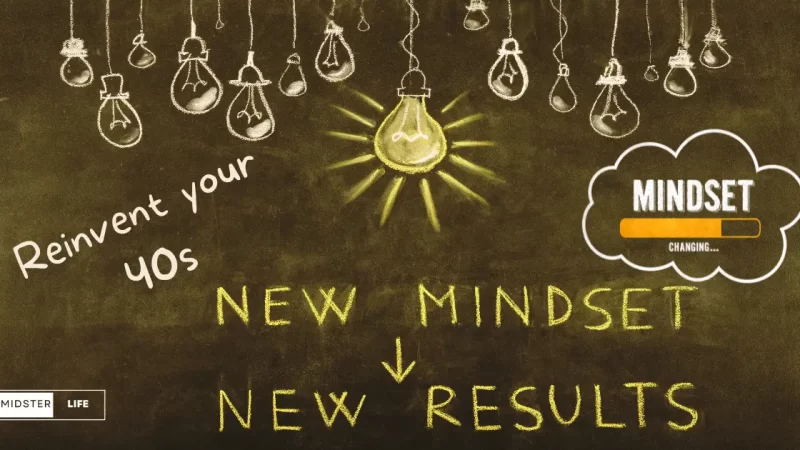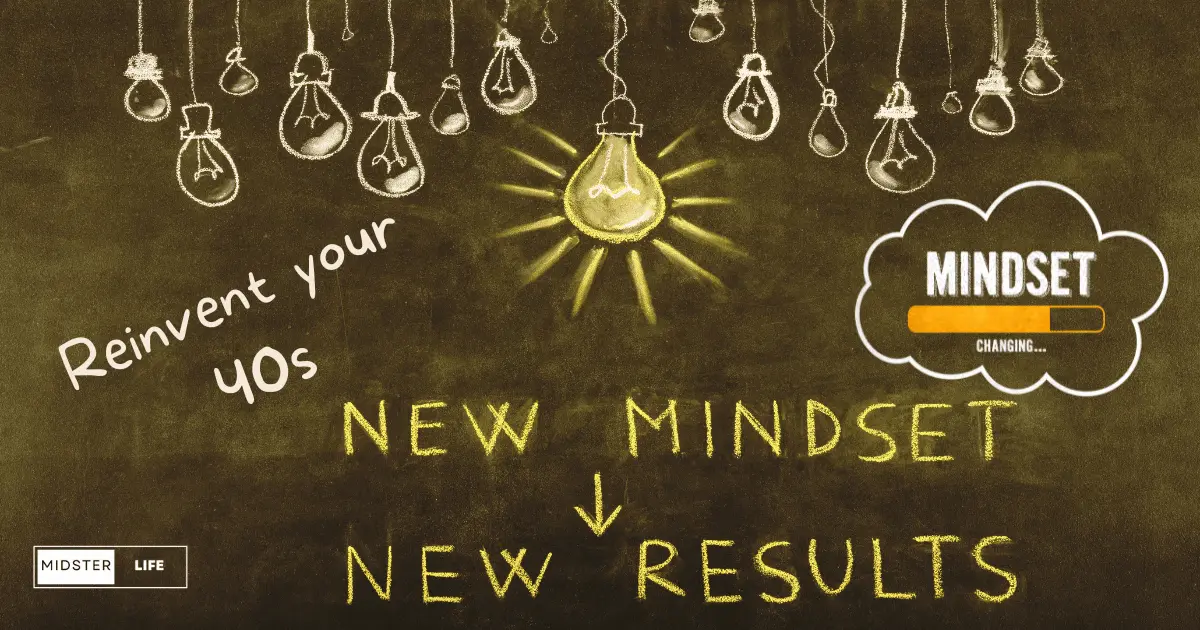Master Your Mindset: The Key to a Happy Life in Your 40s
As a member of the over-40s club, I can confirm that this period is full of transitions and transformations. It’s a moment when we stop to assess our lives and consider if we’re genuinely content with our direction. And if not, we start to contemplate what adjustments we need to make to achieve happiness.
One of the most crucial changes we can make during this time is to gain control of our mindset. Our mindset is how we see the world, significantly impacting our well-being and achievements. By mastering our mindset, we can adjust the way we think and feel about ourselves and our lives, and by doing so, we can build a happier and more gratifying future.
But what does mastering our mindset imply, and how can we accomplish it? In this post, we’ll comprehensively explore the notion of mastering a growth mindset, explaining why it’s essential for our joy and success in our 40s (and beyond). We’ll also share practical pointers and techniques to help you achieve it.
This article is for anyone feeling stuck in a routine, struggling to find purpose and meaning in their lives, or merely seeking ways to enhance their happiness and well-being.
Why Mindset Matters in Your 40s
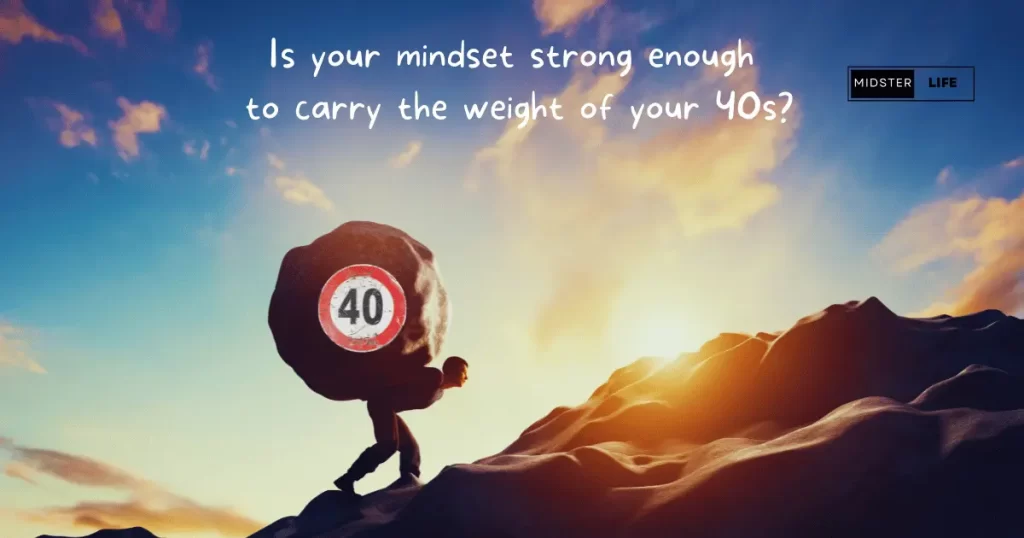
How mindset affects life in your 40s
Your 40s can be a time of significant change and transition. Your 40s can be a decade of significant life changes, ranging from a full-on midlife crisis to career changes, family responsibilities, and even health concerns.
Your mindset plays a crucial role in navigating these changes and challenges. Your thoughts and beliefs shape your actions and behaviors, ultimately determining your success and happiness in life.
Often men in their 40s can become more introspective and reflective, which is ok. It helps us assess where we are with our lives and get to the core of where we want our lives to move next.
The Challenges of Your 40s
If you are in your 40s and reading this, I’m sure you already feel some of the stress and pressure of the common challenges this decade provides.
Career changes, such as job loss, burnout from excessive pressure and responsibility, or dissatisfaction with your current job, can be particularly challenging to navigate at any point in life. But in your 40s, you may also have additional demands from raising a young family or caring for aging parents.
And then there’s your health. Your 40s may be the first time in your life when you become confronted with your mortality as health issues rear their head.
These challenges can be overwhelming and make us question our identity, purpose, and meaning.
Social and Economic Challenges to Mindset

It’s also important to recognize that social and economic factors can significantly impact our mindset, particularly in our 40s.
For example, societal expectations can create pressure to conform to specific standards of success, such as owning a home, having a high-paying job, and providing for a family. These expectations can cause us to feel like we’ve failed if we don’t meet them, leading to negative self-talk and a fixed mindset.
Economic factors such as job loss or financial struggles can also impact our mindset. Losing a job can be a blow to our self-esteem and confidence and can make it challenging to maintain a growth mindset. This can be particularly painful in our 40s if we look around and see successful peers. The financial struggles resulting from this can also cause stress and anxiety, making maintaining a positive outlook on life challenging.
But it’s important to remember that these factors don’t have to define us or our mindset. We can take control of our perspective and focus on what we can control rather than what we can’t.
A shift in personal mindset can make all the difference in overcoming these challenges and embracing your 40s and beyond with a renewed sense of purpose. Our experiences and challenges are unique to us and shape our mindset. This can be a strength that we can utilize for growth.
How Mindset Can Help Overcome These Challenges
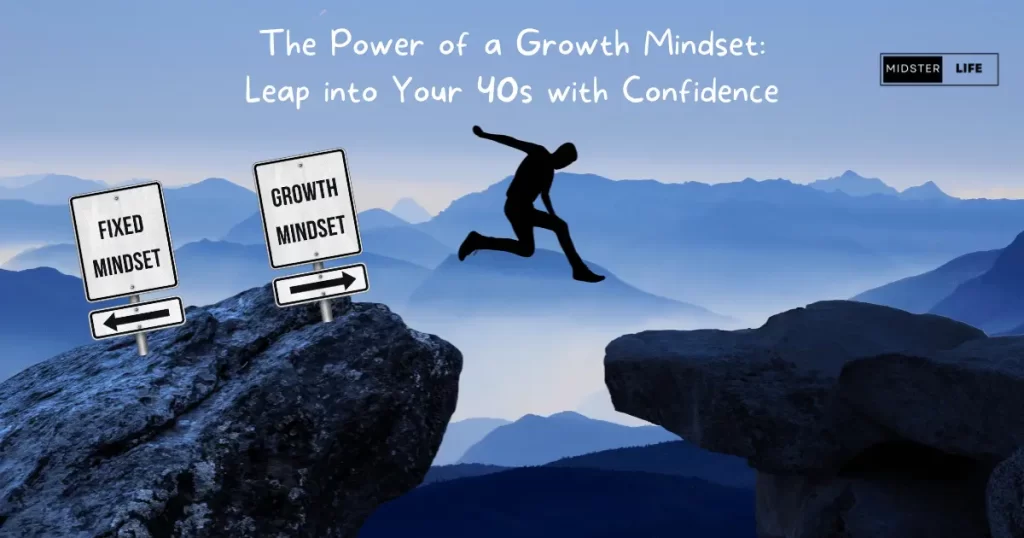
As we’ve discussed, you’re 40s can throw a lot of challenges your way. But if you adopt a growth mindset, you can tackle these challenges with more confidence and resilience.
A growth mindset means believing your abilities and potential aren’t set in stone. Through hard work, perseverance, and learning, you can develop them over time. This means that instead of seeing challenges as threats to your identity or self-worth, you can see them as opportunities for growth and learning.
With a growth mindset, you’ll also develop resilience and adaptability. These are essential qualities to have when facing significant changes in your life. Whether it’s a new career path, a health issue, or caring for loved ones, you can bounce back from setbacks, learn from your mistakes, and keep evolving.
Think of it like working out. You start small, maybe just a few push-ups a day. But with consistent effort, you become stronger and more capable over time. It’s the same with your mindset. If you’re willing to put in the work, you can build the mental muscles you need to take on any challenge that comes your way.
The Benefits of a Growth Mindset
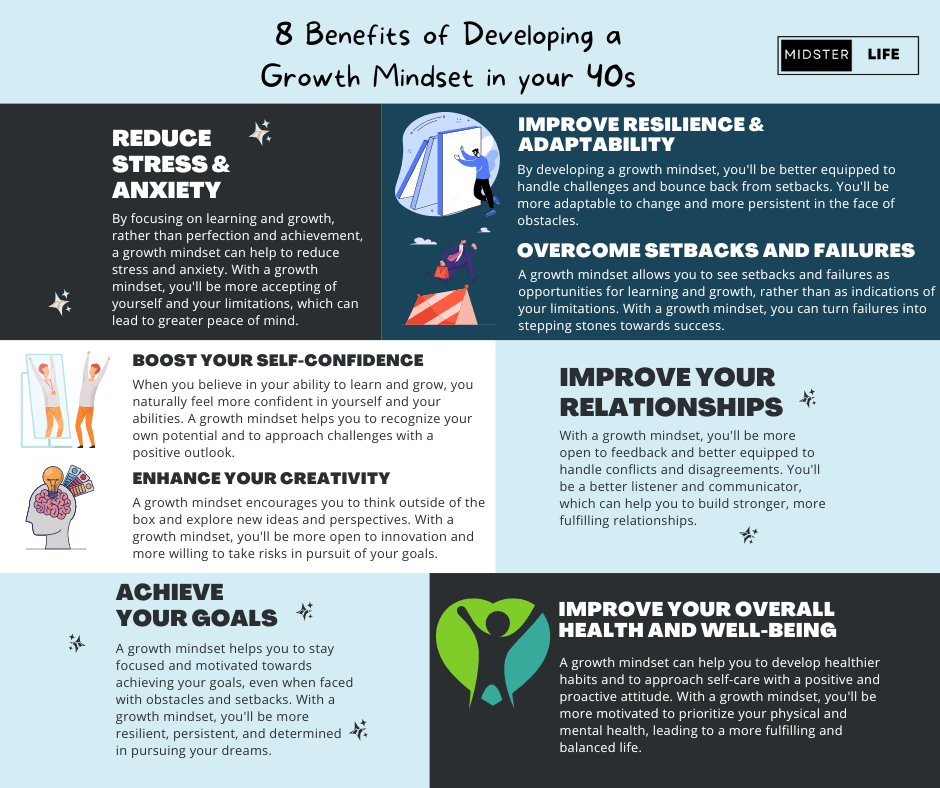
Developing a positive, growth mindset can profoundly impact your life in your 40s and beyond. By developing a growth mindset, you can:
- Improve your resilience, adaptability, and perseverance
- Overcome setbacks and failures
- Boost your confidence and self-esteem
- Enhance your creativity and innovation
- Improve your relationships and communication skills
- Achieve your personal and professional goals
- Reduce stress and anxiety
- Improve your overall health and well-being
Mastering your mindset can unlock your full potential and create a happy, fulfilling life in your 40s and beyond.
The Science of Mindset
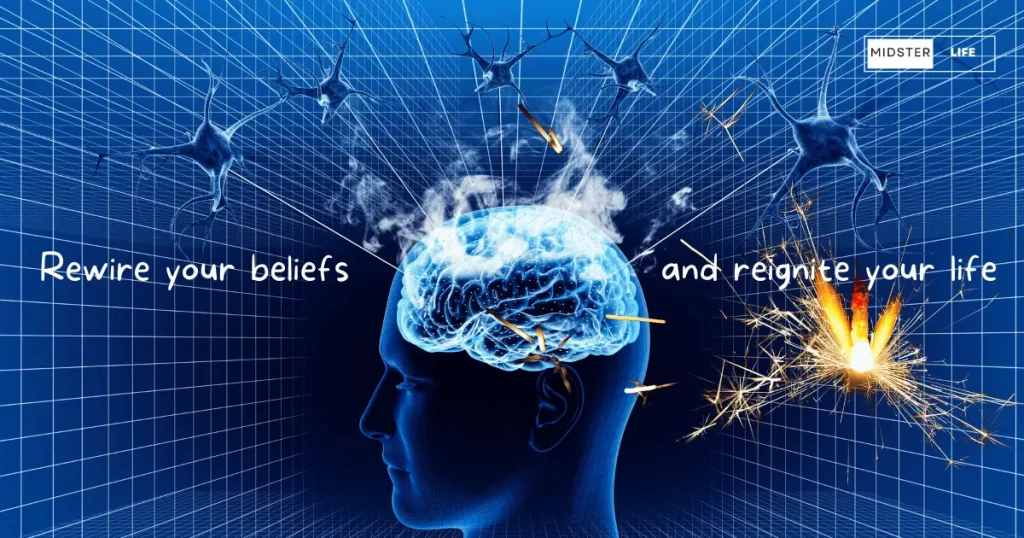
The Neuroscience Behind Mindset
Our mindset isn’t just a set of beliefs and attitudes. It’s a complex network of connections in our brains. And our brain can change and rewire itself through a process called neuroplasticity.
By intentionally changing our thoughts and beliefs, we can create new connections in our brains and change their structure. This means we can train our brains to have a positive and growth-oriented mindset.
This is important because our brain has a negativity bias. That means it’s more likely to focus on negative experiences and thoughts. This can lead to a fixed mindset, where we believe our abilities and intelligence are set in stone and can’t be changed.
But by intentionally focusing on positive experiences and thoughts, we can cultivate a change in mindset. And as we mold our brain towards a growth mindset, we believe hard work and dedication develop our abilities.
The Impact of Mindset on Physical and Mental Health
But it’s not just about your confidence and personal growth. There are physical and mental benefits to adapting our mindset to a growth mindset.
For example, Research into adults over 50 with coronary heart disease demonstrated that growth mindset interventions effectively reduce stress, anxiety, and depression. By adopting a growth mindset, participants developed a greater purpose in life, which not only positively impacted their mental health but also resulted in reduced physical symptoms and better physical health.
Alternatively, if you have a negative and fixed mindset, it’s a different story. Studies show that negative emotions such as depression, anxiety, and anger are associated with a weaker immune response, making individuals susceptible to illnesses and diseases.
Another study shows there are many benefits to maintaining a positive outlook as you age, demonstrating that participants in the study that had a more positive outlook on aging lived up to 7.5 years longer!
The Link Between Mindset and Success
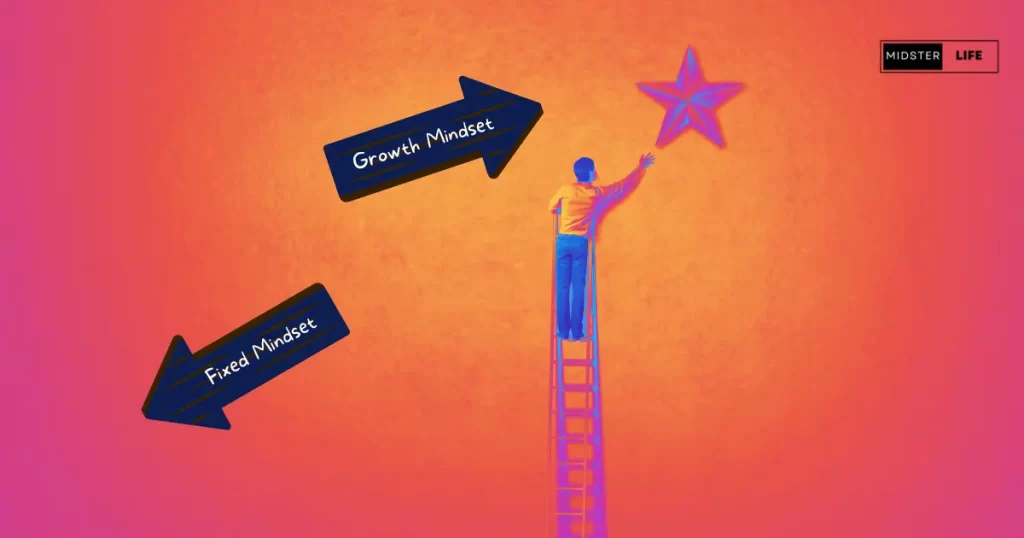
So, our mindset also plays a crucial role in our success and, potentially, the longevity of life. It has been well-documented that there are links between a growth mindset and higher levels of achievement, creativity, and resilience.
One of the most prominent experts in this area is Carol Dweck. Carols’ work argued that individuals with a growth mindset were more likely to succeed personally and professionally.
A study by Lisa Blackwell further supported this. Blackwell researched the effects of mindset on middle school students, demonstrating that mindset interventions led to significant improvements in academic achievement, particularly for those who had previously been struggling.
By embracing a growth mindset, even in middle age, we allow ourselves to take on challenges and learn from failures, leading to continuous improvement and growth.
But if we continue through our 40s with a fixed mindset, we will be held back from reaching our full potential, fearing failure, with a reluctance to take on new challenges. This can limit our growth and success in our personal and professional lives.
How to Master Your Mindset in Your 40s
If you’re looking to develop a mindset that will help you live a happy life in your 40s and beyond, you can take several key steps. Here are some strategies that can help you develop a mindset of mastery:
Setting Goals and Creating a Plan
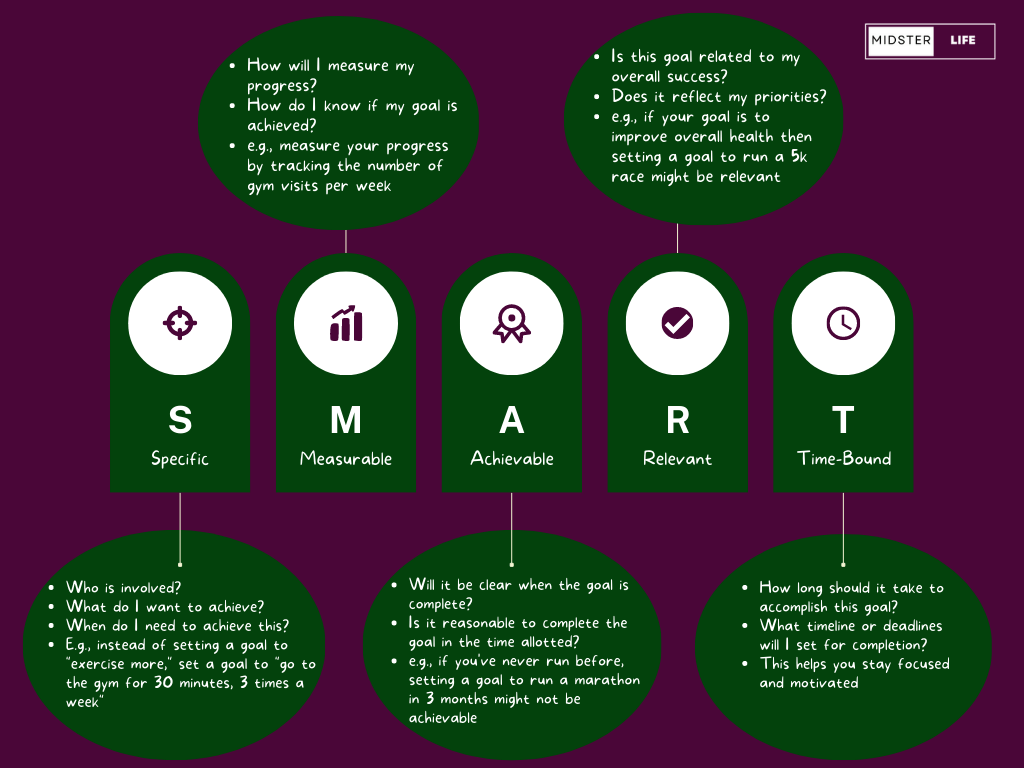
One of the first steps to developing a growth mindset is to set goals and create a plan for achieving them. This can help you stay focused and motivated and give you a sense of direction and purpose. When setting goals, it’s essential to make them SMART to ensure they are well-defined and achievable. Break the goals into smaller, manageable steps and create a timeline for achieving them.
Here’s what each of the letters in SMART stands for:
- Specific: Your goal should be clear and specific rather than vague or general. For example, instead of setting a goal to “exercise more,” set a goal to “go to the gym for 30 minutes, 3 times a week.”
- Measurable: Your goal should be measurable to track your progress and know when you’ve achieved it. For example, you could measure your progress toward your exercise goal by tracking the number of gym visits per week.
- Achievable: Your goal should be challenging but still achievable. It should be something that you can realistically accomplish with effort and dedication. For example, if you’ve never run before, setting a goal to run a marathon in 3 months might not be achievable.
- Relevant: Your goal should reflect your overall priorities and values. It should align with your personal or professional aspirations. For example, if your overall goal is to improve your health, then setting a goal to run a 5k race might be relevant.
- Time-bound: Your goal should have a specific deadline or timeline for completion. This helps you stay focused and motivated, ensuring you can measure your progress along the way. For example, you could aim to run a 5k race in 3 months.
Identifying Limiting Beliefs

Another important step in developing a growth mindset is identifying and overcoming limiting beliefs. These beliefs hold you back and stop you from achieving your full potential.
You’ll typically experience these through the internal stories you tell yourself. Some common examples include “I’m not good enough,” “I don’t deserve success,” and “I’m too old to change.” But it’s important to recognize these beliefs are not true! They’re thoughts, not facts! And they are holding you back.
So how can you overcome these limiting beliefs? Ask yourself, is this thought fact or fiction? What evidence is there to support this thought? Then think about times when you have succeeded or received positive feedback. Can you think of examples that will blow this limiting belief out of the water?
Practicing Positive Self-Talk

Then, replace those limiting beliefs with more positive and empowering beliefs. For example, instead of thinking, “I can’t do this,” you could replace it with, “I can’t do this….YET, but I will learn!”. This will help you build a more positive, growth-oriented mindset and an inbuilt belief that where you are right now is not a permanent, unchangeable place. This way, you can build confidence and self-esteem around action, which will help you stay motivated and focused.
Surrounding Yourself with Positive Influences
The people you surround yourself with can have a significant impact on your mindset and your life. To develop a growth mindset, surround yourself with positive, supportive people who believe in you and your goals. Seek mentors and role models who can inspire and guide you and avoid negative or toxic influences that can hold you back.
Cultivating Gratitude

The next step in developing a growth mindset is to start cultivating gratitude. This isn’t always easy when you feel ground down by daily life, and I’ve experienced firsthand how difficult it is to find and focus on the good things in your life when all you can see is what isn’t working.
But the key thing to know here is that gratitude is a skill you need to practice and work on regularly. It involves focusing on the good things in your life and expressing gratitude for them. By doing this, you stay optimistic, and it can help you overcome challenges and setbacks.
A great way of building gratitude into your everyday life is to keep a gratitude journal and take time each day to reflect on the good things in your life. And remember, it doesn’t have to be about the big stuff. You can be grateful for that first cup of coffee in the morning, how you feel after that run, or the laughter from your kids while they play. Once you start, you’ll begin to notice more and more aspects of your life you can be grateful for.
Embracing Change

Finally, embracing change and being open to new experiences is also important. It will be difficult to alter a fixed mindset without pushing yourself outside your comfort zone. When new opportunities present themselves to you, try to take them, even if the first thought to pop into your head is “no .”Often these first thoughts are our limiting beliefs popping up in a futile attempt to “protect us” from a perceived uncomfortable situation.
By being aware and catching these thoughts early, you can turn them into something positive, opening yourself up to growth. This can help you stay adaptable and resilient and help you grow and evolve as a person. So don’t be afraid to step outside your comfort zone and try new things, even if they seem daunting or unfamiliar.
Master Your Mindset After 40 – Growth Mindset in Action
In the animated video below, we’ll take you on a journey through our character’s experiences and show you how a growth mindset can help you navigate some of the most common challenges faced by men in their 40s.
As we enter our 40s, we often face major changes and transformations. It’s a time when we stop to evaluate our lives and decide if we’re on the right path. One fundamental change we can make during this period is to gain control of our mindset.
Our perspective on the world impacts our achievements and well-being, and by mastering our mindset, we can think more positively and constructively about ourselves and our lives.
In this article, we’ve explored why mindset matters in our 40s and beyond, how it can help us overcome challenges, and practical strategies for developing a growth mindset. By applying these concepts to our everyday lives and building sustainable habits, we can unleash our full potential and create a happy, fulfilling life in our 40s and beyond.

